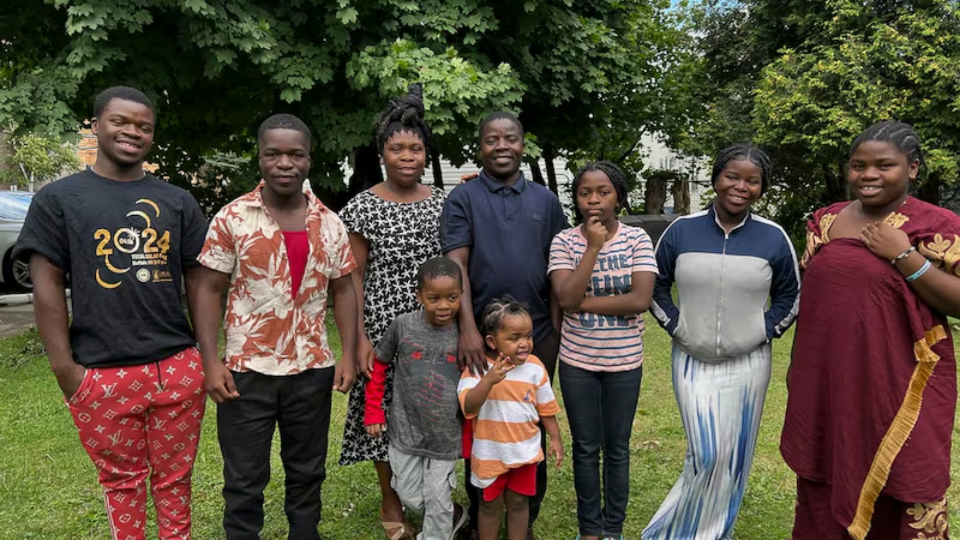
Swahili-branch
Amos Makulu (center) poses with his family in their new hometown of Buffalo, New York, in 2024. Makulu has been instrumental in inviting people to learn more about the restored gospel of Jesus Christ. Photo provided by David Olson, courtesy of Church News.All rights reserved.This story appears here courtesy of TheChurchNews.com. It is not for use by other media.
By Joe Wirthlin, Church News
In his vision of the tree of life in the Book of Mormon, the prophet Lehi started out “in a dark and dreary waste” (1 Nephi 8:7). Praying for mercy from God, Lehi came across a tree “whose fruit was desirable to make one happy” (verse 10). After Lehi tasted of the fruit, he began searching for his family, desiring them to “partake of it also” (verse 12).
Lehi’s vision of the tree of life is one of many different witnesses of Christ found in the Book of Mormon: Another Testament of Jesus Christ. This vision also tracks onto the life of Amos Makulu, a refugee from the Democratic Republic of Congo.
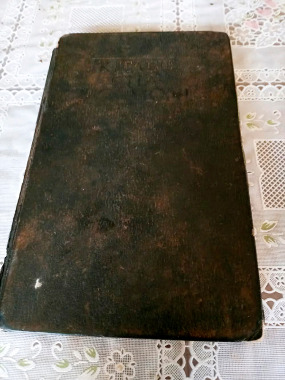
Swahili branch
This copy of the Book of Mormon was given to Amos Makulu in 2006, who knew it was true the moment he started reading it. Photo taken in 2024 in Buffalo, New York. Photo provided by David Olson, courtesy of Church News. Copyright 2023 Deseret News Publishing Company.Makulu fled from his home in 2006, finding safety in a refugee camp in Lugufu, Tanzania. While there, he met a man named Mchumbe, who also fled to safety from Nairobi, Kenya. Makulu became friends with Mchumbe and asked him if he had anything that Makulu could read while they were in the refugee camp. Mchumbe gave Makulu a copy of the Book of Mormon.
Mchumbe had been given the Book of Mormon by missionaries from The Church of Jesus Christ of Latter-day Saints in Nairobi, Kenya, and took it with him when he fled his home. However, Mchumbe had lost interest in the Book of Mormon and was looking for someone else to give it to.
According to Elder David Olson, a missionary who worked with Makulu, Makulu knew that the Book of Mormon was true the moment he first read it. He had been a preacher for Jehovah’s Witnesses before fleeing his home, but upon reading the Book of Mormon with another friend from the refugee camp, Denis Akulu, they both “started to learn, and we were very happy,” Makulu said.
Like Lehi before him, Makulu started to share what brought him so much happiness with others in the refugee camp, building a “family” of interested learners. While the Book of Mormon was an excellent teaching tool, he and “his family of 11 people” had many questions. “We had to find out the answers to those questions with the missionaries and Church leaders,” Makulu said.
Through the use of letters, Makulu and his family got in touch with the Kenya Nairobi Mission and spoke with missionaries. According to Makulu, they learned “many things about the gospel” over the next six years and wanted to be baptized and join the Church. However, the closest congregation to their location was in Dar es Salaam, Tanzania, roughly 1,171 km or about 728 miles away.
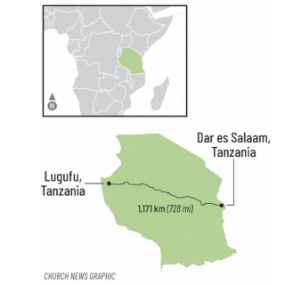
Swahili-Branch
A map showing the distance between Lugufu, Tanzania, and Dar es Salaam, Tanzania, the distance which Amos Makulu walked in order to be baptized. Graphic by Church News.Copyright 2023 Deseret News Publishing Company.Makulu was undaunted by the distance. After he was unable to secure plane tickets, Makulu and two of his family members decided to walk across the country from Lugufu to Dar es Salaam. Makulu and his friends were baptized in 2014; shortly afterward, Makulu immigrated to the United States, settling in Buffalo, New York. He became one of the first Church members in the area who speaks Swahili, though he also knows French and Kibembe, a language spoken commonly in the DRC.
Elder Olson and Elder Abocha Ebakyelo, two Swahili-speaking missionaries serving in the New York Buffalo Mission, have worked extensively with Makulu as he has shared his testimony with those around him.
“From what I see in Amos, he just has such a passion,” Elder Olson said. “We’ve been working with him towards creating a branch with our Swahili group.”
Elder Ebakyelo agreed: “He is a good man, and he’s very comfortable with the gospel. We as missionaries have worked with him a couple times as he joins in on our lessons.”
There are currently 46 Swahili-speaking members of the Church who meet together, with 43 more people who are interested in attending. Makulu knows almost all of them and regularly attends missionary lessons with people, sometimes surprising the missionaries themselves when he shows up.
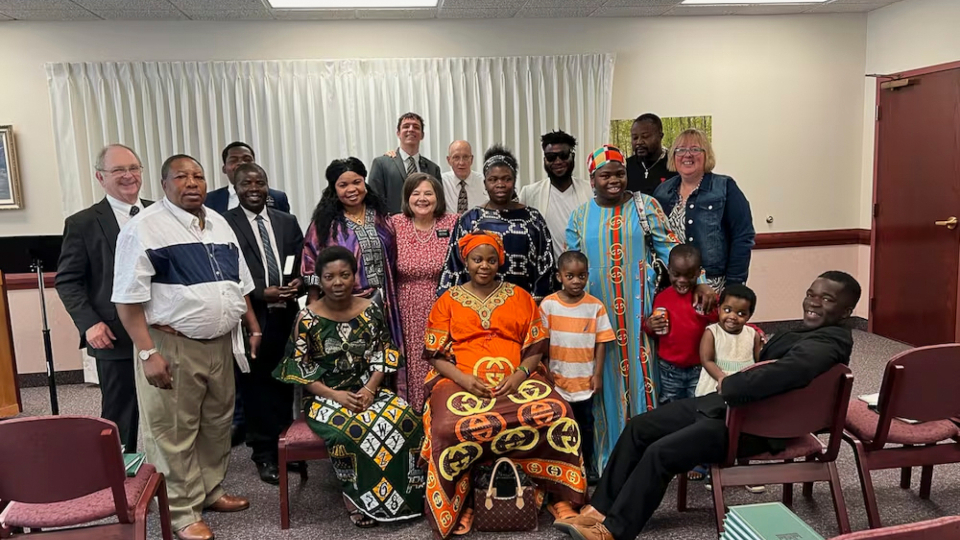
Swahili-Branch
Members of the Swahili-speaking group in Buffalo, New York, pose for a photo with the missionaries in 2024. Amos Makulu (third from left, holding a book) helped build and strengthen the group of Swahili-speaking Church members. Photo provided by David Olson, courtesy of Church News.All rights reserved.“He knows the gospel really well,” Elder Ebakyelo said.
“He knows that through the Lord anything is possible and that the group will be able to grow into a strong branch,” Elder Olson added.
Makulu has remained in touch with his friends in Africa, who have spread across Tanzania, Kenya and the DRC. “It has become a large group,” he said. He also said that “more than 30 families” living in Africa have been baptized and joined the Church.
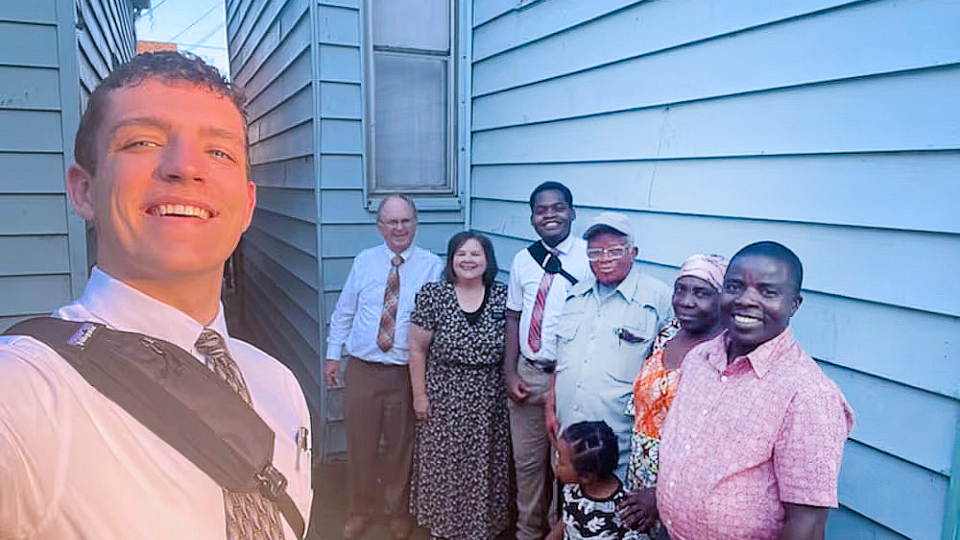
Swahili-branch
Elder David Olson (left) takes a selfie with senior missionaries Sister and Elder Spencer, his companion Elder Abocha Ebakyelo, a family they are teaching and Amos Makulu (right) in Buffalo, New York, in 2024. Photo provided by David Olson, courtesy of Church News.All rights reserved.“After knowing the truth of the restored gospel, I have changed, and my testimony has changed,” Makulu said. He said he plans to study “until I know this gospel fully,” and he encourages everyone to learn and “know the truth about our faith.”
“Our faith is good, and we have love for you and everyone,” Makulu said.